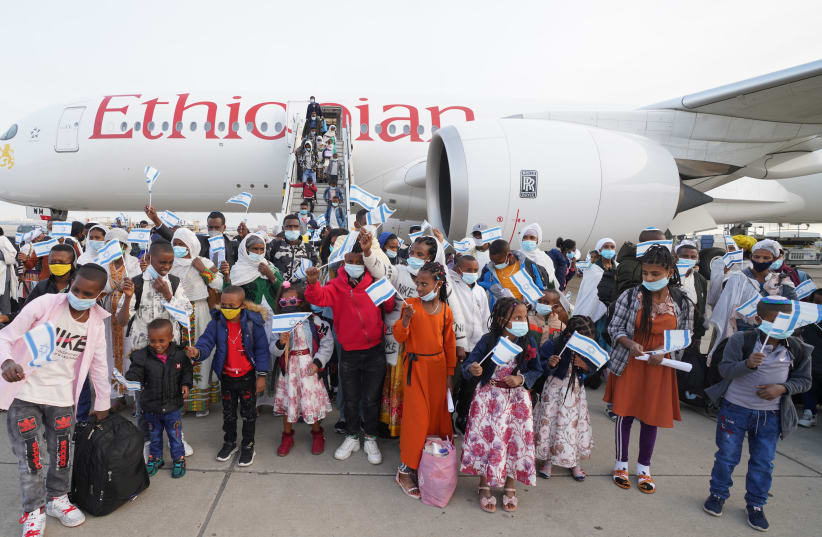The Jewish Diaspora has been around far longer than Star Trek has been on-screen. Throughout our history we have learned the costumes of the places we lived in, we adopted distinctive identities, and we became products of where our ancestors lived over the years. But one thing is certain: No matter the language or skin color, the connections to the Land of Israel and Jerusalem are common to all Jews, just as the holidays, core costumes and holy books are for us. This, by UN definition, makes us an indigenous people: “the inheritors and practitioners of unique cultures and ways of relating to people... [who] have retained social, cultural, economic and political characteristics that are distinct from those of the dominant societies in which they lived.”
This is what is so confusing about us.
All Jews are native to the Land of Israel, no matter if they lived in the Middle East, Africa, Argentina, Europe, China, or the Amazonas of Brazil; no matter the geographical proximity to the land itself. Furthermore, we have had a long Diaspora, during which we have not lost our peoplehood, our religion or our connection to the Land of Israel, our ancestral homeland. In some cases, we have adopted the cultural traits of the people around us, and adopted their language and costumes into our identity. The result includes beautiful and unique Jewish traditions and languages such as Yiddish, Ladino, and Judeo-Arabic. As the written language remained Hebrew, the spoken language was changed.
We developed distinctive identities as well. Large communities of Jews are now known by their recent Diaspora identities, including Ashkenazi, Sephardi, Mizrahi and Beta Israel. We developed Jewish cuisines, clothes, culture, theology, philosophy and political ideas as we have influenced and were influenced by social issues in each Diaspora.
However, another thing happens when you are in a long diaspora: You adopt some of the negative attitudes of the people surrounding you. Often when we were surrounded by people who had power over us, even if they oppressed us, we adopted their behaviors toward those who were “lower” in the social scale.
RACIAL HIERARCHY is real and minorities are often playing into it as well, without even realizing it. In Israel, for example, within the Mizrahi community, you will find that many Mizrahim who hold bigoted views toward other Mizrahi groups. From my Iraqi family’s side, I know that some view North Africans and Yemenites as inferior. But even within the Iraqi Jewish community, those who are from Baghdad look down at those who are from Basra, a poorer city in Iraq. Yet social and racial hierarchies are foreign to Judaism. Nowhere in Jewish texts does it say one should prefer a person based on their skin color, income or geographic location.
In the pursuit of acceptance, we have allowed racist ideas to infiltrate our people. We Jews – the victims of mass murder and genocide, refugees who were treated as second-class people – know better. We cannot hold it against the victims of centuries-long oppression for trying to survive, to assimilate. However, we must also remember that our ancestors died for resisting this assimilation. Even if the white majority in Western countries shows a friendly face, being polite to us and welcoming us at the top of the social pyramid, remember that this can change in a blink of an eye, as it has many times before.
Assimilation into the majority culture is something we have seen from antiquity to the present. Jews often had that choice. Some Jews felt nationalistic but not religious, and vice versa.
We must understand Jews for what we are: one people, but also a diverse people because of our long Diaspora. Speaking about this diversity does not negate any other story, and it does not weaken the ties that all Jews have to Israel.
I call on all Jews to recognize our common roots and to oppose those who want us to assimilate and erase our identity, be it those who invented the self-identification of “Arab Jews” to discount our connection to the Land of Israel, or the anti-Zionist Jews who think Yiddish must be the only spoken Jewish language. We can value Arabic Jewish culture and preserve Yiddish, as we also remember who we are.
It is up to those Jews, as with any other religious minority in a diaspora, to do whatever they want, even if they wish to assimilate, or identify as Arabs, or believe that they are part of the white majority. But we must do so on our own terms, knowing that the Jewish people like all people deserve sovereignty in their national homeland and self-determination as a people.
It is time for reckoning in our community. We need to reconsider these non-Jewish ideas of racism and how we treat people of color. It is not an attack on Jews to discuss our internal problems, but it is an attack on all Jews to be racist. Our community is more important than any popular social or political ideologies. Our story and our people must live long and prosper.
The author is an Israeli writer, speaker and senior fellow at the Tel Aviv Institute. Follow him on Twitter at @henmazzig.
